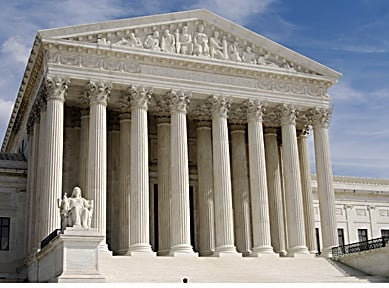You have /5 articles left.
Sign up for a free account or log in.

U.S. Supreme Court
The U.S. Supreme Court on Monday declined to hear an appeal of a case that major higher education associations (and some judges) said had major implications for academic freedom in doctoral education. But a lawyer for the woman whose suit led to the dispute said that the case was about a unique set of circumstances and wouldn't affect anyone not directly involved.
The ruling that the Supreme Court left standing by declining to hear an appeal revived a lawsuit by a former graduate student against the University of Oregon. Her suit argued that professors had retaliated against her for raising issues of gender bias by refusing to chair her dissertation committee. A 2-to-1 ruling in 2012 by the U.S. Court of Appeals for the Ninth Circuit did not find that she had been retaliated against, but said that there was enough evidence to merit a full consideration of her claims by a lower court.
The suit states that when one professor withdrew as dissertation chair, he told other faculty members that the student shouldn't earn a Ph.D. and that -- as a result -- 15 faculty members in her department declined to serve as her chair, effectively forcing her out of the program. The university maintains that the decisions the professors made about Monica Emeldi were based on legitimate judgments of her academic performance and that she offered no concrete evidence of gender discrimination.
The appeals court's opinion acknowledged that Emeldi had never presented conclusive evidence of discrimination, and had admitted in a deposition that some of her thinking about the alleged bias amounted to "speculation." But the opinion said that there was “ample circumstantial evidence” of causation between her complaints and the subsequent rebuffs she received from faculty members to justify keeping the case alive.
Some judges on the appeals court -- and a number of higher education associations -- said it was detrimental to graduate education to allow the case to go forward without more definitive evidence of bias.
In October, the full U.S. Court of Appeals for the Ninth Circuit declined to reconsider the ruling of its three-judge panel. In an unusual move, seven judges who believed the case should have been heard again issued a dissent saying that the earlier ruling had failed to recognize that the relationship between graduate student and dissertation chair is not typical of the employee-employer relationship, and that graduate education needs some legal protection.
Keeping the case alive "jeopardizes academic freedom by making it far too easy for students to bring retaliation claims against their professors. Plaintiffs will now cite Emeldi in droves to fight off summary judgment: We may not have any evidence, but it’s enough under Emeldi. Defendants will go straight to trial or their checkbooks -- because summary judgment will be out of reach in the Ninth Circuit," said the dissent. It added: "The relationship between professor and Ph.D. student requires both parties to engage in candid, searing analysis of each other and each other’s ideas. Methodology, philosophy and personality often lead to intractable disputes and, when they do, the professor must be free to walk away without fear of a frivolous discrimination suit."
Similar themes were cited in a brief by the American Council on Education and other higher education associations urging the U.S. Supreme Court to take the case.
But Eric Schnapper, a professor of law at the University of Washington who represented Emeldi in urging the Supreme Court not to take the case, said that the higher education associations and the dissenting judges were wrong. He said that the case is simply about discrimination, and that Emeldi should have the right to a trial on whether she has enough evidence that bias played a role in the demise of her Ph.D. ambitions.
"I believe that the predictions in those briefs were incorrect," Schnapper said via e-mail. "This appeal involved application of well-established standards of proof to what were quite unusual circumstances. A year from now no one in higher education (outside the officials in this one case) is going to remember this case."








